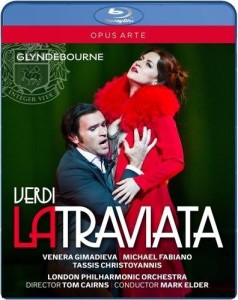This updating of Verdi’s La traviata by director Tom Cairns and designer Hildegard Bechtler adds little to the opera, but neither does it detract. The costumes are a combination of present day and Belle Epoque; the set, in three sections, features a curved quilted wall (a sort of stand-up mattress) on the right, and on the left another curved wall, this one an elegant wood. The middle, curtained “panel” is different for each scene and a verdant landscape for the country house. Men are in formal dress, women in appealing gowns, and they’re boring–nothing lusty or individual: why should Violetta have to give up a life filled with tedious fashionistas? The party scenes are a bit cramped due to the curved walls, which work well for the more intimate scenes.
At the start of each act Violetta is lying dead, stage front–we get it. Precisely why Annina is in almost every scene–Violetta sings her big first-act scena to her, as if she were a confidante, and it thereby loses its intimacy–is a mystery, and having Giorgio Germont’s voice piped in, reading the letter (instead of Violetta) in Act 3 is a catastrophic mistake. Alfredo turns into a milquetoast whenever his father appears. Violetta is left alone on stage to die at the opera’s end–what point is being made by this?
In brief, production/direction-wise, things happen, but for no apparent reason. And so, nothing is really new that matters here except for the singing, which is mostly spectacular. Young Russian soprano Venera Gimadieva is a real find: attractive and a good actress with an agile voice absolutely even and appealing, of good size and capable of expressing grand emotion. Imagine taking her letter reading away! But she gets both verses of “Addio del passato”, happily, and her pianissimos are lovely, well-judged, and always in tune. She is a big star at the Bolshoi. All her Violetta is lacking is heart–that special desperation and sincerity that moves an audience to tears.
Michael Fabiano’s Alfredo is impetuous, idealistic, and puppy-love-ish, and to be honest, looks a bit stupid (it could be the wig); but aside from some weirdly sharp singing in his first-act duet with Violetta, he sings ravishingly, including a blazing high C at the end of his second-act cabaletta. His soft singing is lovely, his phrasing princely. Tassis Christoyannis is a youngish tyrant of a Germont, but his bright, solid baritone and dignified phrasing win the day. Hanna Hipp’s Flora is vivid; she’s noticeably annoyed that her party in Act 2 may be spoiled by a duel. The rest of the cast are mostly quite good.
Aside from a slightly too quick “Parigi o cara”, Mark Elder leads a wonderful, forwardly propelled performance, handsomely played. It’s one of the few performances of this opera I’ve heard in which the rhythmic pulse is not only just right, but in which there is never a mismatch between stage and pit.
Subtitles are in English, French, German, Japanese, and Korean, and the picture is excellent, though slightly too dark at times: it was probably the same in person. In short, this is a very good performance and soprano and tenor are superb–but as a first Traviata, I’d be brave and go for the deconstructed performance with Natalie Dessay on Virgin, which is gut-wrenching, or the Netrebko/Villazon on DG from Salzburg. The singing may not be as fine (in Villazon’s case it is), but both shows get closer to this opera’s core.
































